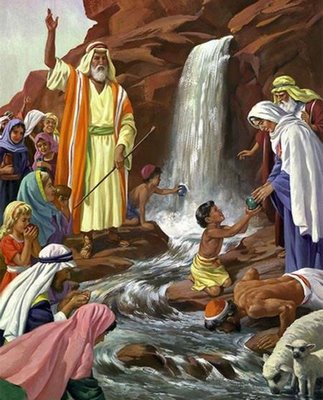"Pray for me to be made more charitable: we're in the middle of a Faculty crisis wh. tempts me to hatred many times a day."
C. S. Lewis, in a Letter to Sheldom Vanauken,
Quoted in "A Severe Mercy," by Sheldon Vanauken
They provoked him at the waters of Meribah.
Through their fault it went ill with Moses;
for they made his heart grow bitter
and he uttered words that were rash.
Through their fault it went ill with Moses;
for they made his heart grow bitter
and he uttered words that were rash.
Psalm 106:32-33
My wife and I are hosting a bi-weekly book club, in which we read and discuss Sheldon Vanauken's "A Severe Mercy." The C. S. Lewis quote with which I opened this blog is from last night's chapter. The two verses from psalm 106 were in the Office of Readings this morning. I have probably read Psalm 106 many dozens of times, maybe as many as a hundred, given its recurrence in the Liturgy of the Hours, which I have been praying daily for a couple of years. However, that particular passage stuck in my head this morning, as I prayed. It attached itself to that C. S. Lewis quote and refused to be separated.
It is easy to see how the two are related, but I didn't get the significance at first. Of course it is nice to know that C. S. Lewis was human and subject to the same petty temptations as the rest of us, but he made no secret of that. Indeed, for a careful reader, there is no doubt that he was not only tempted, but far more aware of the temptations than most of us are.
He probably would demur my comparing him to Moses, but to me he has been a sort of Moses. He has been a prophet and a law-bearer. I thought about this for a bit, still not getting the significance. I felt that Moses should not have allowed the people to break his focus on God. He should not have allowed them to "get to him." Just like C. S. Lewis shouldn't let other people's uncharity tempt him to uncharity himself.
But then a paradigm shift happened and I realized that what the Holy Spirit was getting at was not addressed either to C. S. Lewis or to Moses. It is addressed to me. I am not the one being tempted and tried by those under me, because I am not over anyone. I am not a spiritual leader or authority. I am not the tempted. I am the tempter.
 For a brief second I saw myself, not as Moses being embittered, but as one of the children of Israel embittering him. I saw my grumbling, sarcasm, flippancy and nonchalance in a new light. How many times have I, by my behavior and words and attitude, or even just by my ignorance, tempted someone else to hatred? How often have my wise-crack comments, instead of enlightening or assisting someone, irritated them to the point where they thought unkind things about me? Probably far more often than I realize.
For a brief second I saw myself, not as Moses being embittered, but as one of the children of Israel embittering him. I saw my grumbling, sarcasm, flippancy and nonchalance in a new light. How many times have I, by my behavior and words and attitude, or even just by my ignorance, tempted someone else to hatred? How often have my wise-crack comments, instead of enlightening or assisting someone, irritated them to the point where they thought unkind things about me? Probably far more often than I realize.
Doesn't that make me, in some way, partially responsible for their sin? How many times have I set out to share the great gift of Jesus; and gone from there to simply sharing "the Faith" which is facts about Jesus; to sharing "my faith" which is how I feel about those facts; to finally trying to force my views on others, or at the minimum looking down on them or judging them because they refuse to see things my way?
This is another example of psalm 90:8 "You have set our iniquities before you, our secret sins in the light of your presence." Or Psalm 19:12a "But who can discern all his errors?"
To which our response must be, "Deliver me, O Lord, from my hidden faults!" Psalm 19:12b.
His grace is sufficient.







